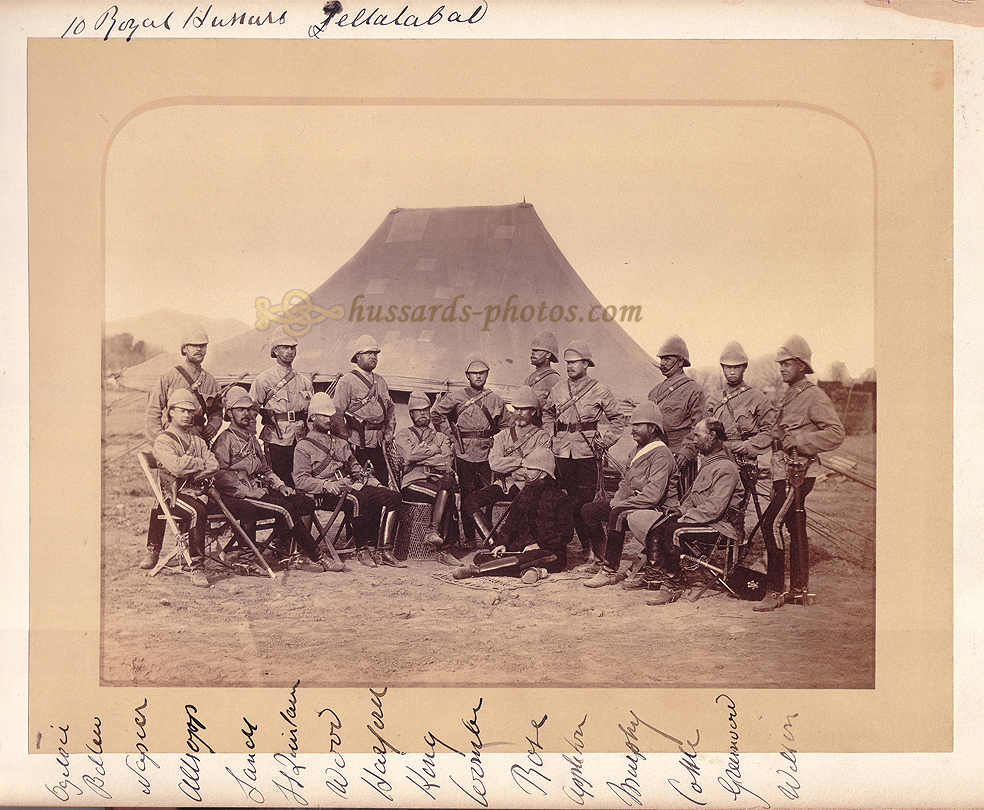|
Albumen
print pasted on an Album page |
|
Officers
of the 10th Hussars at Jallalabad, Afghanistan, 1879 |
The 10th
Hussars had left Portsmouth for India on January 10 1873 on board
the troopship Jumna. Upon reaching Bombay they took their quarters
in Muttra (Bengal). Their tour was marked by the ceremonies
associated with the visit to India of their Colonel, the Prince of
Wales, in 1875-76, whom they entertained in due form. In 1878 the
10th Hussars relieved the 4th Hussars in Rawul Pindee. Tension
was high between Great Britain and Russia following the treaty of
San Stefano, and fears of a Russian immixion in Afghanistan
prompted the Indian Government to insist on the reception at Cabul
of a British mission. The stalling
of the Amir and subsequent misunderstandings lead to an ultimatum
being set for November 20th. Meanwhile military
preparations were actively pursued. Three columns were to move
simultaneously :
- One (under the command of General Sir Sam Browne, consisting of
about 10,000 men, with thirty guns) through the Khyber Pass to
Dakka,
- Another through the Kuram valley, south of the Khyber, with the
Peiwar Pass as its objective,
- The last from Quetta into the Pisheen valley, to march forward
to Candahar after reinforcement by a division from Mooltan.
Two squadrons of the 10th Hussars were assigned to the Khyber
Field Force (under the command of Major Wood as Lieutenant-Colonel
was on sick leave) - one Squadron being detached to the Kuram
Field Force. On
November 21 1878, no answer having been received, Sir Sam Browne
proceeded to the Khyber Pass and attacked the Ali Masjid position.
After a day's fight the defenders retreated during the night. The
advance of Sir Sam Browne's force continued unopposed and they
reached Jallalabad by December 20.
On December 23, the officers of the 10th Hussars, in true Hussar
fashion, contested their first steeplechase aound the city !
If you want to
know more about the Afghan War, I'll refer you to
Garen
Ewing's excellent website.
|
|
|
The
photograph
|
| This
photograph was taken by John Burke, one of his famous views of the
Afghan War. John Burke accompanied the Khyber Field Force column
in an unofficial position, his application as Official
Photographer having been rejected. He later sold his photographs
in albums in Britain. They rate among the first photographs of the
area.
The photo shows Sub-Lieutenant
Harford, who perished
in the dramatic crossing of the ford of the Kabul river, in the
night of March 31st, 1879. The photo is thus anterior to that
date.
|
|
|
The Officers of the
10th Hussars
|
| Here is a short
presentation of the officers depicted on the
photograph. This is not gonna be perfect, as, to begin with, there
are only 16 names under the photograph - and 17 officers are
represented ! There is furthemore some misspelling of the names.
The missing name is most likely that of
one of the officers located to the very right of
Lieutenant-Colonel Kerr (the two standing officers above him, and
the one sitting on the ground) ; the last five ones to the right
of the photograph should match the five last names.
|
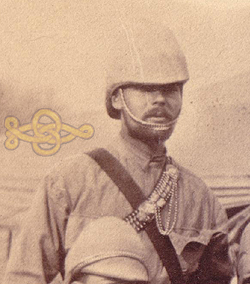
|
Lieutenant
Ogilvy
David
Stanley William Ogilvy was born on January 20 1856, the eldest son of the
5th Earl of Airlie and Henrietta (daughter of Lord Stanley).
Educated at Eton then Balliol College (Oxford), he joined the army
in June 1874. He joined the 10th Hussars from the Scots
Fusiliers Guards on May 2 1876.
On September 25 1881,he will succeed to the titles of 6th Earl of
Airlie, 12th Lord Ogilvy of Airly, and 6th Lord Ogilvy of Alith
and Lintrathen.
In 1884 he will be with the Regiment when it will be diverted from
its way home to Egypt and Sudan, but will not board again the
Jumna with the Regiment. He will take part in the Nile expedition in 1884-85 (medal and 3
clasps, Khedive's Star, Medjidie 4th class, twice mentioned in Despatches,
slightly wounded at Abu Klea and again at El Gubat).
He will marry Lady Mabel Gore (daughter of the Earl of
Arran) on January 19 1886 ; men and officers of the 10th
Hussars attended that brilliant event, graced by the presence of
the Prince of Wales, Colonel of the Regiment. He will
serve with the Regiment until december 1897 when he will be
gazetted Lieutenant-Colonel commanding the 12th Lancers.
He will fight in the Boer War in 1900, mentioned in despatches for
Gallantry at Modder River, and wounded near Blandfort. He will be
killed in action on the June 11 1900 battle of Diamond Hill, after
leading his regiment in a charge which saved the guns.
He was also honourary Colonel of the 3rd (Dundee Highland) Volunteer
Battalion, Black Watch.
|
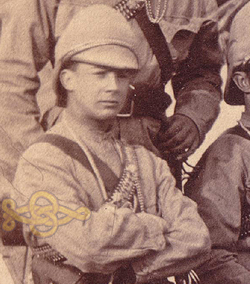
|
Sub-Lieutenant
Bellew
The Hon.
George Leopold Bellew was born on January 22 1857, the son of Sir
Edward Bellew, 2nd Baron of Barmeath and Augusta Mary Bryan. He
was gazetted a Sub-Lieutenant on December 8 1877. On October 13
1880 his name will be legally changed (by Royal Licence) to "George
Leopold Bryan", as per the will of his uncle, George Leopold Bryan.
He will
not be coming back to England with the Regiment on board the Jumna
(reaching Portsmouth on April 21), being absent on leave. He will
however duly attend the July 14 1884 Levée. He will take
part in the Nile Expedition in 1884-85. He will be
promoted to Captain on September 18, 1887, and later reach the
rank of Major in the 10th Hussars in July 1896, and will retire
(on retired pay) on February 15 1898. He'll hold the office of Deputy
Lieutenant of County Kilkenny.
On
February 2 1900, he will be recalled from the Reserve of Officers
to be appointed Second in Command of the 5th Battalion of Imperial
Yeomanry, with the temporary rank of Major in the Army, and will
proceed to South Africa. He will come back to England by
late 1900, leaving Cape Town on board the Dunottar Castle on
November 21, and reaching Southhampton on December 7. He will
resign this appointment on January 8 1901. He will become High
Sheriff of County Louth in 1902. He will become 4th Baron Bellew
of Barmeath, co. Louth and 10th Baronet Bellew, of Barmeth,
co. Louth on July 15 1911. He will take part in WWI. In 1914 he
will be elected a Representative Peer of Ireland.
He will
marry Elaine Carlisle Leach on April 9, 1927 (aged 70 !). He will
die on June 15 1935.
|
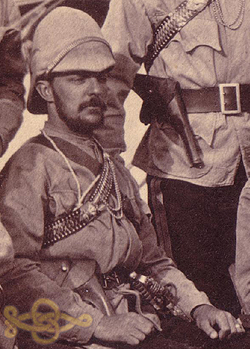
|
Lieutenant Napier
The Hon. James Pearse Napier was
born on December 30 1849, third son of Robert George Napier, who was created in 1868 Baron Napier of Magdala. He was educated at Cheltenham College and Jesus
College, Cambridge, where he gained a B.A.
James P. Napier was gazetted
Sub-Lieutenant in the 10th Hussars on October 18 1872. He
left for India -where his father was then
commander-in-chief- with the
Regiment on board the Jumna, leaving Portsmouth on January 10, 1873.
He was promoted to Lieutenant
on October 30 1874. On August 27, 1875, Ralph Broomfield
Willington Fisher, from the 5th Dragoon Guards, was transferred to
the 10th Hussars "in succession to Lieut. the Hon. J.P.Napier,
a Probationer for the Indian Staff Corps". Lieutenant Napier
resigned this appointment two years later, and was re-appointed to
the 10th Hussars on July 10, 1877.
Napier will be among the party of
the 10th Hussars that will attempt to cross the Kabul River at the fords of Kaleh-i-Izack on the night of 31 March 1879. He
will narrowly escape death by drowning, being swept off his horse and weighed down by his heavy boots,
sword, revolver and ammunition. Struggling, he'll manage to get to the shallows but
will have to be helped by Private Crowley (10th Hussars) to the safety of the shore. Napier
will later present Crowley with a gold watch and chain.
He will be promoted to Captain on
November 12 1879, and will pass into the Staff College in 1884, obtaining his majority
on April 15 the same
year. After graduating from Camberley he will be appointed Brigade-Major at Shorncliffe in 1887.
On August 23 1890, Major Napier will be posted to the North-Eastern
District Command (Head Quarters York), as Deputy Assistant Adjutant
General for Instruction. He will be promoted to Lieutenant-Colonel
on July 27 1892, placed on Half Pay in 1897, and will reach the rank of Colonel in 1900, when he'll
become Assistant Adjutant General , Southern Command, a post he'll
hold until 1903. He will retire from the Army in February 1905. He
will become 3rd Baron Napier of Magdala on December 11 1921,
succeeding his eldest brother (his second brother dying in 1914). He
will die on May 2 1935.
|
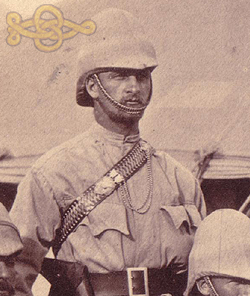
|
Sub-Lieutenant
Allsopp
The Hon. Herbert Tongue Allsopp was
born on December 5th 1855 at Foremark Hall (Derbyshire). He had been a noted
cricket player for Cambridge University, Right Hand Bat and a Fast
Bowler (First Class span in 1876).
He was commissioned as a Sub-Lieutenant on October 12 1877. He previously
was a Lieutenant in the Worcester Militia.
During the Afghan War he commanded a
detachment of the advance force in the capture of Ali Masjid.
Second Lieutenant Allsopp will find
passage home, along with Lieutenant Rose, on board the Indian Troopship
Jumna, leaving Bombay on April 18, 1880, and reaching
Portsmouth on May 15. Upon arriving he will be presented to his
Colonel, the Prince of Wales, on the occasion of the Levée held
at St. James's Palace on May 31 1880.
He will be promoted to Lieutenant on July
1 1881. He will serve in the Sudan Expedition of 1884, being
present at the battles of El Teb and Tamai.
He will be promoted to Captain
on August 16 1887. He will retire from the service on January 3
1890, receiving a gratuity.
He will join
the board of the Lion Fire Insurance Company in December 1895. By
that time he will be living in Walton Bury, Stafford. Herbert
Tongue Allsopp will die on January 31 1900 at Barnwood,
Gloucestershire.
|
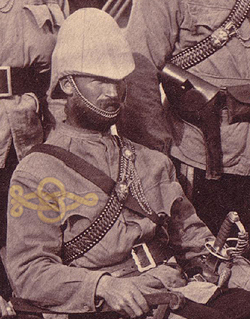
|
Lieutenant Sandes,
Adjutant
Charles Sandes was a
Sergeant-Major at the Cavalry Depot when he was appointed
Riding-Master of the 10th Hussars, on September 5 1873, vice David
Walsh, deceased. On November 23, 1877, he was appointed Lieutenant
vice E.Cunard, deceased (again !). He was appointed Adjutant of the
Regiment on January 22, 1878, vice Cavendish (promoted - and not
deceased this time).
He will sail back to England (along
with Paymaster Murphy) on board the Serapis, reaching Portsmouth in
May 1882. On January 23 1883, Charles
Sandes will be promoted to Captain into the 6th Dragoons. He will be
seconded on June 26, same year.
It seems that Charles Sandes will join the Army Pay Department in 1883.
In 1886 he will sail back to India with that appointment. He will be granted the honorary
rank of Major on February 26 1893 (by that time he will be back to
Aldershott). On February 15 1898 Paymaster and Hon. Major Charles
Sandes will be appointed Staff Paymaster. He will be replaced in
that position on July 26 1901, but retained as Supernumerary to the
establishment (under the provisions of Article 473, Royal Warrant ,
Oct.26, 1900 for those interested).
He will be placed on retired pay in October 1903, now a honorary
Lieutenant-Colonel.
|
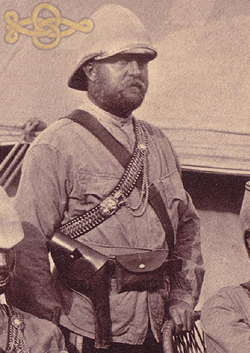
|
Captain St.Quintin
Thomas Astell St.Quintin was
commissioned a Cornet on December 30 1859. He purchased his
commission as a Lieutenant on January 16 1863.
He married Hon. Mary Eleanor Frances Browne, daughter of John
Cavendish Browne, 3rd Baron Kilmaine, on April 30 1868.
He purchased his commisison as a Captain on August 17 1870. He left
Portsmouth with the Regiment for India on January 10 1873, on board
the troopship Jumna.
In 1874 Thomas Astell St.Quintin
is reputed to have introduced the game of polo to the western
district of Victoria, Australia, through his brothers, John and Henry, who had
settled there, buying a sheep station called Dwarroon, near Cudgee.
The year is disputed, but the Warrnambool Standard of 22nd August,
1874 reported a game at Jetty Flat (the eight players including the
three St Quintin brothers).
He will be awarded a Brevet of
Major on November 22 1879. On March 10 1880, that promotion will have him
presented to the Queen at the Levée at Buckingham Palace, by the
Prince of Wales, Colonel commanding the 10th Hussars. He will be
promoted to Major on July 26 1881. He will be seconded for service
as remount agent at Calcutta on July 4 1882. He will be promoted to
Lieutenant-Colonel on May 18 1886, and will exchange into the 2d
Dragoon Guards same year on August 10. He will exchange again the
following year, joining the 8th Hussars on July 20 1887, in command
of the Regiment, then in India. He will be promoted to Colonel on March 31 1890 ;
he will leave the command of the 8th Hussars on
October 19 1892, and will be appointed Assistant Inspector of Remounts at
London.
The Imperial Yeomanry will be formed by a Royal Warrant on December
24 1899, and the Imperial Yeomanry Committee will be created on
January 4 1900 and charged of its administration. Colonel St.
Quintin will be recalled from retired pay and nominated in that
Committee as an Assistant Adjutant-General - in charge of remounts.
10.000 horses had to be delivered in a rush - not an mean feat.
Colonel St.Quintin will go to South Africa from march to September
1900, but the real trouble will occur when the purchase of horses (esp.
in Ireland and Austria-Hungary) will be investigated, the rush of
the organizing having allowed middlemen to profit enormously from
the contracts, selling inferior remounts for the price of good ones.
Thomas Astell St.
Quintin will die on 03 Apr 1918 in Matlock, Derbyshire.
|
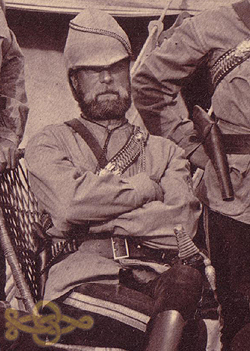
|
Major Wood
Edward Alexander Wood was born in
1841. He was commissioned a Cornet on July 16 1858. He purchased
the commissions of Lieutenant on September 30 1859, and of Captain on July 13 1867. He left for India with the
Regiment on board the Jumna on January
10, 1873. The Times reported that "Madame Wood and child"
were also on board.
On April 1 1875, Captain Wood was
seconded Adjutant of the Cavalry Depot at Canterbury. He was transferred back from the Supernumerary List (and
back to India) on May 31 1876, upon promotion to Major.
In November 1878,
Lieutenant-Colonel Kerr being on sick leave, Major Wood was in
command of the two squadrons of the 10th Hussars present at the
taking of Ali Masjid in the Khyber Pass (mentioned in despatches). He was still in command when Sir Browne's troops reached Jallalabad on
December 20 1878.
Major
Wood will be awarded a Brevet of Lieutenant-Colonel on November
22 1879. He will be promoted to Lieutenant-Colonel, and succeed
Colonel Kerr at the head of the Regiment on June 28 1881. In 1884 he
will command the Regiment when it will be diverted from its
way home to Egypt and Sudan, fighting at El Teb on February 24 and
Tamaii on March 13. The 10th Hussars will board again the Jumna and
leave Suakin on March 30 to reach Portsmouth on April 21. Colonel
E.A. Wood will be made a C.B. on May 22 1884, and will
introduce the officers of the 10th Hussars,
"on return from active service", to the Prince of
Wales (their Colonel in Chief), at the
Levée held on July 15 1884 at St. James's Palace.
He will be a regular member of the Army Dress and Equipment
Committee (issuing specs for Cavalry Swords in 1885...). He will be placed on half-pay
in March 1886, and appointed Inspecting Officer of Auxiliary Cavalry
on March 30 1886. He will again be at the head of the 10th Hussars
at the July 1886 Royal Review at Aldershott, leading the Light
Cavalry Brigade. On April 8 1890, he will be appointed to the
command of the 7th (the Royal Fusiliers, City of London Regiment)
and 57th (the Duke of Cambridge's Own Middlesex Regiment) Regimental
Districts. He will complete this appointment in April 1893. He will
become Major-General on August 28 1894, Commanding the Troops at
Shorncliffe - where he will die on May 22 1898.
|
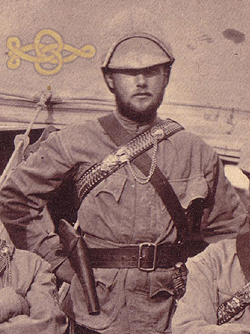
|
Sub-Lieutenant Harford
Second son of William H. Harford,
esq., of Barley-wood and Lawrence-Weston, Francis Hervey Harford
was born in March 1858, and educated at Winchester and R.M.C. Sandhurst. Passing out from Sandhurst in 1877 in the first class, he was gazetted to the 16th Foot, then serving in Ireland,
and transferred to the 10th Hussars the same year (November 23). He
sailed from England in the following month, leaving Portsmouth on
board the Troopship Euphrates on December 30, and joined the Headquarters at Rawal Pindi. On the outbreak of the Afghan War, he
went with the regiment into the Khyber Pass, and was present at the taking of Ali Musjid on
November 21.
Forming one of the ill-fated squadron which was to accompany the force directed to
join General Macpherson’s column in the second Lughman Valley expedition, he
will be swept away with the rest of the squadron, during the night of the
March 31, 1879, in the disastrous fording of the Kabul River at Kala-i-Sak, and
will one of those found missing when the roll will be called after the accident.
Sub-Lieutenant Harford, 46 N.C.Os. and men, and thirteen horses will
be drowned in this disaster, which will be the subject of a famous poem by Rudyard
Kipling.
His body will be found in the
beginning of April, and will be buried with military honours on the evening of the same day, the General and all the officers in garrison following it to its last resting-place.
‘Few young soldiers have gone to an early grave more deeply regretted than the gallant but ill-fated subject of this brief memoir. His life was one of the finest promise, and there are none who knew him who could doubt that that promise would have been fulfilled to the utmost had he lived.’
His missing sword will amazingly be found some 15 years later (during
the Chitral expedition) in the roof beams of an Afghan hut at
Remorah.
|
|
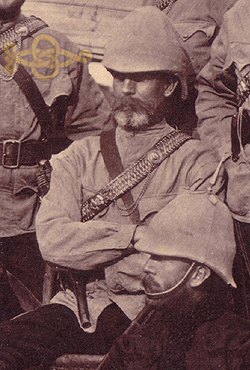
Many thanks to Roy Mills for his help and research, and
identifying QM King
|
Quartermaster King
William King was born on
January 3rd 1831 at Gloucester. He enlisted in the 10th Light Dragoons
in 1852, as a Private. His Regimental number was 1637.
He served in India with the Regiment, and left Bombay on 31st January
1855 for the Crimea.He arrived in Egypt, was collected by the “Jason”
(from Balaklava) on March 18th, and arrived in the Crimea on April
14th. Disembarked at Balaklava 15-16th April 1855. He finally left the
Crimea on June 2d 1856. He was promoted Serjeant in 1859 ; the
regiment was at Hounslow at that time. He was later promoted
Regimental Serjeant-Major. He was awarded a LS&GC Medal as RSM on
March 13th, 1870. (WO 102/2 p.21).
He is shown on the 1871 census at Heston Barracks as Regimental
Serjeant Major, aged 39, born at Gloucester. His wife Mary, aged 30
born at Coventry and two children William, 7, born Dublin and Mary, 1,
born Brighton.
On the 18th October 1872, Quartermaster John James retired, and RSM
William King was appointed in his place . He had served in the ranks
“20 years 303 days”.
He attended the dinner given by the Prince of Wales at Marlborough-House
on December 21st 1872 for the officers of the 10th Hussars, prior to
their departure to India. He left with the Regiment on board the Jumna
on January 10th, 1873.
He died in England on September 9th
1882 at 5 Hopgood Street, Middlesex. The Memoirs of the Tenth Royal
Hussars mention : “On the 9th October [1882], to the regret of
all ranks, the sudden death of Quartermaster W. King in England was
announced. This officer joined as a private in 1852, and became a
sergeant in 1859. He held the appointments of Sergeant-Instructor of
Musketry and Regimental Sergeant-Major, and on the retirement of
Captain James was appointed Quartermaster on the 2nd November,
1872. This post was held until his death, and he performed most
valuable service, both at the time of the embarkation of the regiment
for India and on the preparations being made for the Afghan campaign
and during the whole of that war. He died on the 12th September 1882.
He was succeeded by Quartermaster A. E. Poole.”
His will was proved on 15th March 1883: “The will of William
King, late of 1 Lansdowne Terrace, Stoney Stanton Road, in the city of
Coventry, Quartermaster in Her Majesty’s 10th Hussars who died at 5
Hopgood Street in the County of Middlesex was proved at Birmingham by
Mary Hannah King of 1 Lansdowne Terrace, widow, the relict, the sole
executrix. Personal estate £542.”
He was entitled to the following medals : Crimean War Medal with clasp
“Sebastopol”, Turkish Crimea (as Pte.), Afghanistan Medal “Ali
Musjid” (as Qmr), LS&GC (as RSM).
|
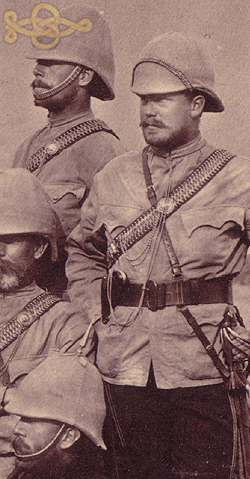
|
Among those three
officers should be Captain Combe and Lieutenant Rose
Boyce Albert Combe (born
August 28 1841) had throughout his military career a strong
association with India. A former Cadet of the Honourable East India
Company Army, he was gazetted a Cornet on August 27 1860, and was
among the 21st Hussars in their early days (they were
raised in 1862 from the 3rd Bengal European Cavalry). He was
promoted to Lieutenant on May 3 1865. He took part in the 1866-67
Abyssinian campaign with the 3rd Sind Horse, and was present as the
Orderly Officer to Colonel Fraser at the action of Arogee, and
capture of Magdala (Medal). He then joined back the 21st Hussars,
where he for some time held the appointment of Adjutant. On October
30 1871 he married Helen Edith (d. May 29 1892), daughter of
Major-General Lousada Barrow, C.B. He was promoted to Captain on
Februray 12 1873, and exchanged into the 10th Hussars - by then in
India - on October 17 1873.
On March 13 1877 he left Bombay on board the Troopship Jumna for
England, reaching Portsmouth on April 14, one day in advance on
schedule after a sailing under favourable winds - though the Jumna
was delayed when she called at Devonport, due to heavy fog. On June
7 1877, he was presented to his Colonel, the Prince of Wales, on the
occasion of the Levée held at St. James's Palace.
Boyce Albert Combe will be awarded a Brevet of Major on November 22
1879. He will be seconded for service on the Staff on February 10
1880 (antedated to November 13 1879), as Deputy Assistant for the
Quarter Master General, Bombay. He will be granted a Brevet of
Lieutenant-Colonel on March 1 1881 ("in recognition of
services during the late Afghan Campaign"), promoted to Major on July
26 1881, and to Colonel on
March 2 1885. He will be appointed Military Secretary to the
Commander-in-Chief in India on September 11 1885, and Commanding
Officer of the 19th Hussars on February 12 1886. He will be placed
on half-pay "on appointment to the staff" on
October 23 1888, and will hold the Local and Temporary Rank of Brigadier
General from January 9, 1889, whilst commanding the 2nd Class
District, Bombay. He will be made a C.B.on May 25 1889, "on
the occasion of the celebration of Her Majesty's Birthday".
He will be placed on half-pay on expiration of his period of service
in this appointment on April 18 1894, then appointed Commandant of
the Cavalry Brigade at Aldershott on January 1 1895. He will become Major-General on March 18
1896, and will command the Curragh District in Ireland. He will be
appointed a First Class District Commander in India on January 16
1900, and placed on retired pay on September 8 1903. He will be
appointed Colonel of the 14th Hussars on July 9 1904, until his death
(in India) on June 3 1920.
Edward Temple Rose was born
on November 2 1855, the son of Rt. Hon. Sir John Rose, 1st Bt., and
Charlotte Temple. He was gazetted a sub-Lieutenant in the 10th
Hussars on June 13 1874.
Lieutenant Rose will find
passage home, along with Second Lieutenant Allsopp, on board the Indian Troopship
Jumna, leaving Bombay on April 18, 1880, and reaching
Portsmouth on May 15. On March 4 1881, Lieutenant Rose, then on
leave at home, will board the Balmoral Castle to sail to Durban,
there to be attached to the 15th Hussars. When the ship will reach
Durban, on March 28 1881, the peace will have been signed with the
Boers. He will be seconded for service on the Staff
on July 11 1882, and promoted to Captain on August 8 1882.
He will marry Lady Cecilia Cathcart, daughter of Alan Frederick
Cathcart, 3rd Earl Cathcart, on July 26 1883.
Captain Edward Temple Rose will resign his commission on February 12
1885.
He will die in 1920.
|
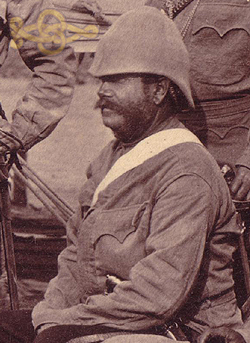
|
Veterinary Surgeon
Appleton
William Appleton was gazetted
Veterinary Surgeon on January 31 1860, and was appointed to the
Military Train. He was transferred to the 10th Hussars on January 2
1869.
He left for India with the
Regiment on board the troopship Jumna, leaving Portsmouth on January
10, 1873. The Times reported that "Madame Appleton and three
children"
were also on board.
He was promoted to Veterinary Surgeon 1st Class
on October 4th 1873.
William Appleton will be appointed
Inspector Veterinary-Surgeon on August 4th 1885 (dated July 27th)
On September 30th same year he will leave Portsmouth on board the
Indian Troopship Malabar, heading for Bombay.
He will be placed on retired pay on April 12th 1887 (dated April
6th).
|
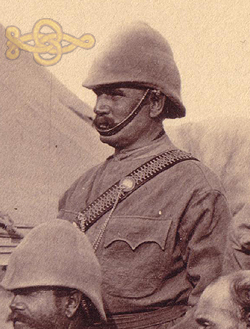
|
Paymaster Stephen Murphy
Stephen Murphy served in the 52d
Light Infantry with the Punjaub Movable Column in the Indian Mutiny
in 1857-5.
He was appointed Paymaster of the 35th (Royal Sussex) Foot on May 8
1867, from the 3d West India Regiment where he held the same
appointment. He sailed for Madras from Southampton on September 20
1867 on board the Peninsular and Oriental Company's screw steamship
Bangalore (Captain N. Roskell). The Suez Canal was not pierced by
then, so the Bangalore's destination was only Suez.
He was granted the Honorary rank of Captain on June 7 1872.
He transferred into the 4th Hussars on October 22 1875.
He transferred to the 10th Hussars on January 30,1877.
He left India for England on board
the Serapis (along with Lieutenant Sandes), leaving Bombay on April
21 1882, and reaching Portsmouth on May 18.
He will be placed on retired pay with the honorary rank of
Lieutenant-Colonel on June 10 1882.
|
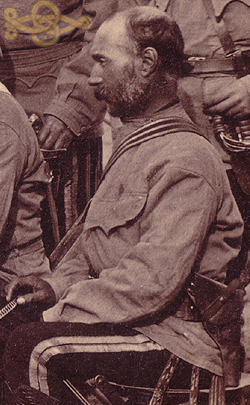
|
Surgeon Major William
Cattell
William Cattell (1829-1919) was appointed
Assistant-Surgeon on March 28th 1854, and soon thereafter took part
in the Crimean War with the 5th Dragoon Guards, being present at
the battles of Balaklava, Inkerman, Tchernaya, and Siege of
Sebastopol (Medal with three Clasps, Sardinian and Turkish Medal).
He was promoted to Surgeon on
July 12th, 1864, and left the 5th Dragoon Guards to be appointed Staff Surgeon at the Cape of Good
Hope.
On November 16th 1866, he was appointed to the 20th Foot. The 2d
Battalion of the Regiment was in the Cape Colony c. 1867, and
shifted to Mauritius in 1870. We do find William Cattell in
Mauritius in 1870 with the 2nd Battalion of the 20th Foot indeed.
The Battalion will come back to England in 1872, reaching
Queenstown on board the Troopship Tamar on January 25th. William
Cattell
will be appointed from that Regiment to
the 10th Hussars on December 10th, 1872.
He soon left with the Regiment
for India, being on board the Jumna on the occasion of her
departure from Portsmouth for Bombay on January 10th 1873. The Times
reported among the 10th Hussars"Surgeon Callett" (sic),
but also "Madame Callett and three children".
He held the relative rank of
Lieutenant-Colonel from March 28th 1874.
William Cattell was also a botanist ;
he was elected an F.L.S. (Fellow of the Linnaean Society) in 1878, and collected plants
along his various postings.
He will be appointed Brigade Surgeon at Aldershott, on November 27th
1879. This appointment is administrative at first, as he will only
reach England on April 16th 1880, arriving at Portsmouth on board
the Indian Troopship Malabar.
This will not be the end of his travels, as he will be appointed
principal medical officer of the forces in Canada in January 1882,
following some service at Malta !
On April 18th 1882,he will be gazetted Deputy Surgeon-General (dated
12th March).
Deputy Surgeon-General William Cattell will be placed on retired
pay on December 4th 1889 (dated November 23rd).
His memoirs are held within the Royal Army Medical Corps "Muniment
Collection".
|
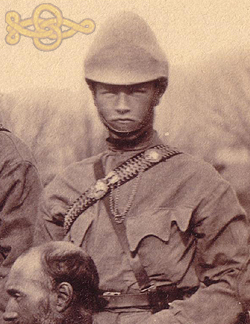
|
Lieutenant Greenwood
Charles Staniforth Greenwood was born
May 1 1857 at Swarcliffe Hall, Birstwith, Harrogate, the second son of Major John
Greenwood and Louisa Elizabeth Barnardiston. In january 1876 he was
declared a successful candidate at the open competition held in
December 1875 for First Appointments to Cavalry and Infantry. He was gazetted
Sub-Lieutenant in the 10th Hussars on February 12 1877. He was promoted to Lieutenant on
March 1 1878. He will leave
Bombay on April 16 1882 on board the Indian Troopship Crocodile, and
will reach Portsmouth on the night of May 12 1882. He will be
presented at the Levée "on return from active service"
by the Adjutant General on June 18 1882.
He will go back to India, and will come back from Egypt on board the
Jumna with the Regiment on April 21 1884.
He will thus again be
presented at the Levée "on return from active service",
by Colonel E.A.Wood, on July 14 1884.
Charles Greenwood will be promoted to Captain on October 3
1884. He will marry Margaret Eleanor Dent in 1885.
He will retire from the service on March 15 1889, receiving a
gratuity. From the Reserve
of Officers, he will join
the 2nd West York Yeomanry (incidentally another Regiment bearing
the title "Prince of Wales's Own") with the rank of
Lieutenant-Colonel on November 7 1891, "under the provisions
of Paragraph 32, Yeomanry Regulations, 1889, as amended by Army
Order 298 of 1890". He will be nominated Sheriff in the
Queen's Bench Division of the High Court of Justice of Yorkshire in
late 1892. The 2nd West York Yeomanry
will be
disbanded in 1894,and his resignation will be accepted by the Queen
on July 17.
He will die on September 24, 1941
at Swarcliffe.
|
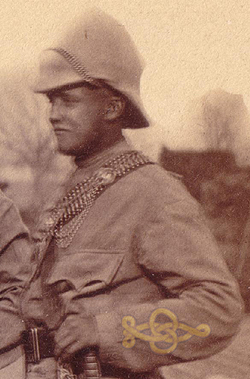
|
Lieutenant Wilson
Lieutenant Richard Henry Francis
Wharton Wilson joined the 10th Hussars from the 4th West York
Militia (where he was also a Lieutenant) on July 25 1876. He
will come back from Egypt on board the Jumna with the Regiment on
April 21 1884 - and will be promoted to Captain on the next day. He will be presented
by Colonel E.A. Wood to the Prince of Wales (his Colonel) at the
Levée held on July 14 1884 at St. James's Palace, "on return
from active service". After
being awarded a Brevet of Major on June 15 1885, he will again be
presented at
the Levée, on July 13 1885 (this time by Major General Harman, C.B.), so it is quite possible he will have been back to
Egypt beforehand. He will be
appointed Deputy-Assistant Adjutant-General for August 27 1895, and
will retire on retired pay on July 17 1896
He will be appointed from the Reserve of Officers to the Imperial
Yeomanry at the outbreak of the Boer War, and will go to South-Africa
in the spring of 1900.
He will leave South Africa on May 8 1901 on board the Mongolian,
reaching Southampton on June 8, which will be "the occasion for
a great demonstration" as the Mongolian will bring "the
first complete Yeomanry detachments from South Africa on board".
Temporary Lieutenant-Colonel R.H.F.W. Wilson, Commandant of the 12th
Battalion, will rsign his appointment on July 10 1901 . He will be
granted the Honorary rank of Lieutenant-Colonel, and permission to
wear his Imperial Yeomanry uniform on January 3 1902. A few days
later, on January 8, he will be appointed Commandant of the 3rd
Provisional Regiment of Hussars. He will be awarded a D.S.O. in the
following months.
|
|
